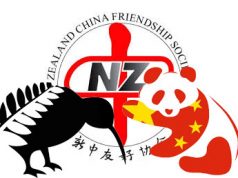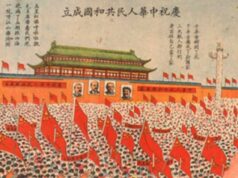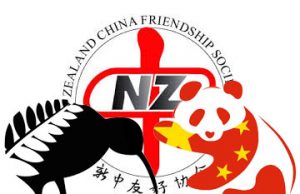~ Next Meeting ~
Liu Guozhong
Vice Principal of Shandan Bailie School
Liu Guozhong is traveling from Palmerston North to speak to us at this meeting. He has worked at the Shandan Bailie School, Gansu Province, since 1989 and is particularly interested in Rewi Alley’s educational philosophy: Create and Analyse: Hands and Mind Together. Guizhong has been involved in a number of cooperative development projects in recent years and is studying Agricommerce at Massey University under a Development Studies Scholarship.
This very special meeting will be different from all our previous ones with a change of day, time, meal and venue:
Saturday, 19 September .. Broadgreen Centre, Nayland Road, Stoke
.. from 12:30pm – 3pm ..
It will begin at 12:30pm with a Pot Luck Luncheon for which we are asking members to please bring food ready to eat. This will be followed by Liu Guozhongs talk. There will be a small charge of $5 to cover some of the costs. Friends and other interested people are very welcome.
Please let us know if you are able to come. Phone Barbara Markland
ph. 544 4712 by Wednesday 16 September.
That evening, interested members are invited to join Liu Guozhong, his wife Wen Zhongqin and the Nelson Branch Executive for a Chinese banquet at the Eastern Cuisine in Queen Street, Richmond. Cost is $28. If you would like to come, please let Barbara know by Sunday 13 September.
LAST MEETING: Diana Clark presented us with a fascinating slice of Nelson history as she retold the story of her great-grandfather, Appo Hocton, who lived here from 1842 until his death, aged 103, in 1920. Dianas enthusiastic, interesting, and often humorous talk held her audience captive throughout. The clear presentation of her collection of large family photographs helped to bring Appo and other family members to life. Dianas talk was also a social commentary on attitudes to early Chinese in New Zealand. Appo himself was the first Chinese to become a New Zealand citizen and was a highly respected member of the Nelson community, yet the Nelson newspaper articles Diana quoted from revealed the harsh attitudes Europeans held towards Chinese generally and their determination to exclude them from migrating here. This proved to be very thought-provoking.
MOON FESTIVAL CELEBRATION: Planning for the Moon Festival Celebration in the Nelson Chinese Garden on Saturday 3 October is progressing well. We will need more helpers on the day to help run stalls and would be delighted to hear from any members who feel they could help with this or make any other contribution to the organisation of the event. June or Barbara would be delighted to \ hear from you by phone, or at the next meeting.
Another request! Maybe some of you still have some Chinese treasures you would be willing to donate to add to those treasures that remained after the Chinese Treasures evening earlier in the year. Please bring them to the next meeting. Money raised from their sale will be added to the He Ming Qing Fund.
CHINESE MOVIE AT NELSON FILM FESTIVAL: Red Cliff (Chi Bi) is a visually stunning Chinese historical epic that ratchets the entertainment factor up to 11 – according to the Japan Times.
Action maestro, John Woo. returns to Chinese soil and his finest form with this historical epic (the biggest budget Chinese language movie ever made) in which heroes and villains are equally complex, battle sequences are thrillingly visceral, and the spectacle is lush and abundant. Cao Cao, the scheming Prime Minister to the Han Dynasty Emperor, leads a massive Northern army to quell the rebel warlords of the South. He severely underestimates the wisdom of the Southern warlords and their strategists. – Sydney Film Festival.
The climactic battle lives up to popular expectations of epic filmmaking, with over 30 minutes of sophisticated military manoeuvres, special effects and human drama in one continuous movement… – Hollywood Reporter.
2008, 148 mins, in Mandarin with English subtitles, rated M (battle violence).
PROMINENT PERSONS AND LEADERS TOUR 2009: Nelson dwellers will have read Matt Lawreys article in their edition of The Leader about Evey McAuliffe leaving for China as a member of this tour on 26 August. By the time of this next meeting, Evey will be back with us and she has agreed to be the speaker at our November meeting and will most certainly have some interesting stories to tell us.
Congratulations to Evey and the Nelson Multi Ethnic Council on receiving one of 12 national awards for their work on improving race relations in Nelson.
DEATH OF NZCFS MEMBER, TOM MILLS (1939-2009): The NZCFS has lost a long serving member with the recent death of Tom Mills. As the former National Treasurer, a long time member of the Tours Committee, a Tauranga City councillor and Deputy Mayor, Tom made a lengthy and important contribution to friendship between New Zealand and China, to the NZCFS and to his Tauranga community.
Diana Madgin wrote:
A visionary who helped shape the modern development of Tauranga is how city councillor Tom Mills was described in his Bay of Plenty Times obituary. NZCFS was a recipient of that visionary perspective, along with Toms ability to get things done. In the early 80s, a young John Meldrum persuaded then National President Jack Ewan to include Tom Mills in an early Prominent Persons Tour. Tom came back fired up about China, John said at his funeral. Tom could see the port city, Yantai, would be an ideal sister city for Tauranga, and he was quick to engender support amongst fellow councillors. In 1988, Tom brought the Tauranga Polytech, Rotary and City Council together to organise the first four people from Yantai to come to New Zealand for a years study: a horticulturalist, an educator, and two IT specialists.
Tom saw friendship tours as the ideal foundation of understanding for newly developing trading partnerships, along with an opportunity for ordinary folk to see China at a modest price. For 18 years, Tom Mills, John Meldrum and, for much of that time, Dave Blanshard, in addition to continuing their respective professions, became the NZCFS Tours Committee. The system they devised incorporated both funding for, and membership of, NZCFS from every client. It was a brilliant scheme, and funding eventually accrued to provide a foundation for the activities of the NZCFS.
NZCFS is enormously indebted to Tom for his far-sighted proposals and the steady work he did for our Society. His quiet, modest voice belied his intense belief in building bridges of friendship, and his clear understanding of corporate infrastructure enabled public and private partnerships in Taurangas development. Tom was Deputy Mayor of Tauranga from 1983 to 1986.
In 2003, when Toms health was already challenged by cancer, he became National Treasurer of NZCFS following Tony Englands death. For nearly two years hes been helping Royden Smith step into his considerable shoes. He offered knowledge, wisdom and insight, says Royden. I have lost a good friend and a wonderful mentor.
SOME SHANDAN BAILIE SCHOOL HISTORY: When their school in Shaanxi Province was threatened by the Japanese advance, Rewi Alley and George Hogg, plus the 60 or so students, packed up and trekked to the old derelict city of Shandan on the edge of the Gobi Desert. There Rewi rented some old temples and turned them into classrooms and workshops, and appointed George Hogg as Headmaster. From the beginning the school was helped by New Zealand friends, who later formed the New Zealand China Friendship Society.
In July 1945 tragedy struck when George died of Tetanus after stubbing his toe while playing basketball with the boys. He was buried just outside the South Gate of the town and Rewi took over as Headmaster.
He named it the Shandan Bailie School after his friend, the American missionary, Joseph Bailie, who had very enlightened ideas on education. The timetable allowed for “half-work, half-study”. In the mornings, half the school was engaged in practical tasks, while the other half had formal lessons. In the afternoons the two halves switched.
An amazing variety of practical skills were taught. There were pottery kilns, paper-making, glass-blowing, spinning and weaving of cotton and wool. There was a leather section, where the hides were scraped, leather polished and dyed and jackets and shoes made. They had a flour mill and they made sugar from beet. There was a farm where they ran sheep sent from supporters in New Zealand. They had a coal mine and a power plant which provided electricity to the whole complex.
The students were illiterate peasant boys (and later girls) who were trained to become useful technicians in a backward country which needed their services badly. Rewi gathered around him a number of foreign teachers with particular skills which they could pass on to the students.














